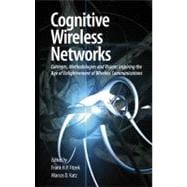
| What is Cognitive Radio and Cognitive Networks? | |
| Introductory Chapter | |
| Cooperative and Cognitive Networks: A Motivating Introduction | p. 3 |
| Cellular Controlled Peer to Peer Communications: Overview and Potentials | p. 31 |
| Cooperative Networks: Social, Operational and Communicational Aspects | |
| Applying Evolutionary Approaches for Cooperation | p. 63 |
| The Social Qualities of Pervasive Wireless Networks | p. 75 |
| Encouraging Cooperative Interaction among Network Entities | p. 87 |
| Competition and Cooperation in Wireless Multi-Access Networks | p. 109 |
| A Cooperative ID for 4G | p. 133 |
| Implementing Cooperative Wireless Networks | p. 155 |
| Scalable Cooperation in Multi-Terminal Half-Duplex Relay Networks | p. 179 |
| Trigger Management and Mobile Node Cooperation | p. 199 |
| Cooperative Mobile Positioning in 4G Wireless Networks | p. 213 |
| Peer-to-Peer Information Retrieval Based on Fields of Interest | p. 235 |
| Cognitive Networks | |
| Introducing Cognitive Systems to the B3G Wireless World | p. 253 |
| Architectures and Protocols for Next Generation Cognitive Networking | p. 271 |
| Scheduling in Cognitive Networks | p. 285 |
| Design of Terminals and Infrastructure Components for Cognitive Wireless Networks | p. 307 |
| Fundamental Limits of Cognitive Radio Networks | p. 327 |
| Spectrum Awareness: Techniques and Challenges for Active Spectrum Sensing | p. 353 |
| Robust Spectrum Sensing Techniques for Cognitive Radio Networks | p. 373 |
| Marrying Cooperation and Cognition in Wireless Networks | |
| Cognitive Resource Manager | p. 397 |
| The C-Cube Concept - Combining Cross-Layer Protocol Design, Cognitive-, and Cooperative Network Concepts | p. 423 |
| Cellular Controlled P2P Communication Using Software Defined Radio | p. 435 |
| A Cooperative Scheme Enabling Spatial Reuse in Wireless Networks | p. 457 |
| On the Energy Saving Potential in DVB-H Networks Exploiting Cooperation among Mobile Devices | p. 473 |
| Cooperative Retransmission for Reliable Wireless Multicast Services | p. 485 |
| IP Header Compression for Cellular-Controlled P2P Networks | p. 499 |
| Cluster Based Cooperative Uplink Access in Centralized Wireless Networks | p. 513 |
| Methodologies and Tools | |
| Cooperation for Cognitive Networks: A Game Theoretic Perspective | p. 533 |
| Spectrum Sharing Games of Network Operators and Cognitive Radios | p. 555 |
| Introduction to NetLogo | p. 579 |
| Analysis of Cooperative Power Saving Strategies with NetLogo | p. 603 |
| Visions, Prospects and Emerging Technologies | |
| Cooperation in Optical Wireless Communications | p. 623 |
| Evolution of Digital Radios | p. 635 |
| CogMesh: A Cluster Based Cognitive Radio Mesh Network | p. 657 |
| Coordinating User and Device Behavior in Wireless Grids | p. 679 |
| Index | p. 709 |
| Table of Contents provided by Blackwell. All Rights Reserved. |
The New copy of this book will include any supplemental materials advertised. Please check the title of the book to determine if it should include any access cards, study guides, lab manuals, CDs, etc.
The Used, Rental and eBook copies of this book are not guaranteed to include any supplemental materials. Typically, only the book itself is included. This is true even if the title states it includes any access cards, study guides, lab manuals, CDs, etc.